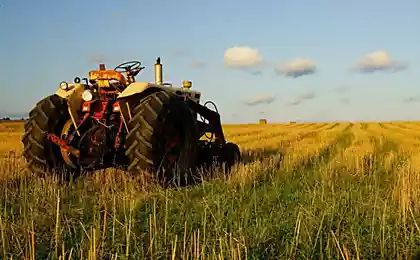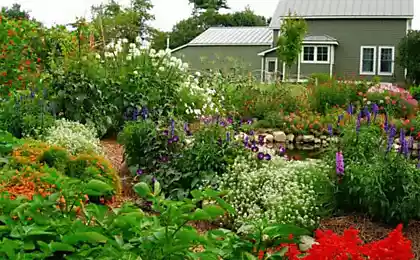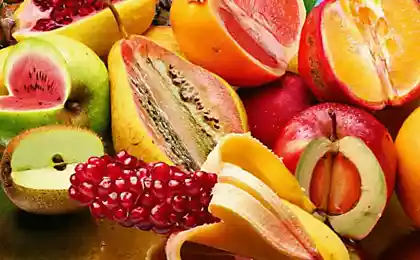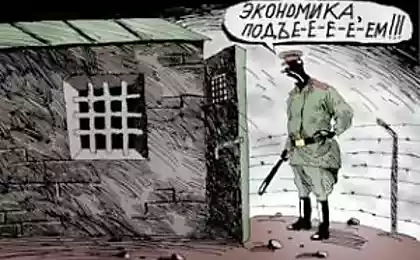1035
Sepp Holzer Permaculture - 10 times more effective than traditional agriculture!
Sepp Holzer - a man of legend. He is the brightest representative of the agricultural areas, which became known as "permaculture" -.. Permanent, ie, natural, agriculture. Today, and say: not just a permaculture and permaculture Sepp Holzer
. Austrian farmer confident that with the help of so-called permaculture can feed the entire planet. It is necessary for this quite a bit: do not interfere with nature
. For a long time, Sepp Holzer at home in Austria called rebellious farmer, but what he does - wild agriculture. For the rejection of the traditional norms of agriculture and experiments, he was forced to pay the fines; moreover, he faces a prison.
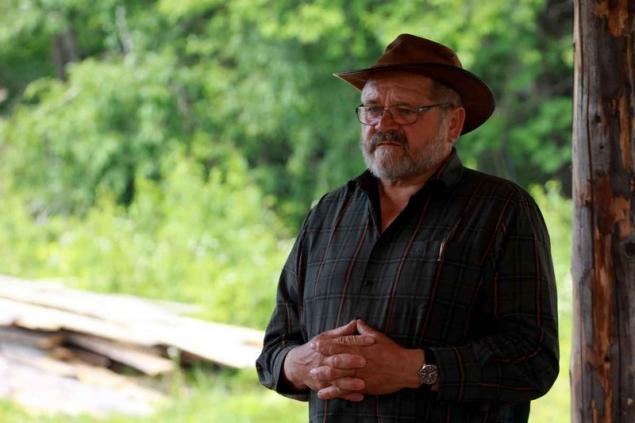
Now, know-how Holzer - the creation of land ridges crater gardens, ponds device - causing many experts and admiration of fans. The secret is simple Sepp Holzer. He oversees the nature and tries to live according to its laws.
Even as a boy on his father's farm, Sepp grew various plants. Then he convened in his garden all the friends and having fun with them, shared discoveries. Roughly the same thing happens today. Only now do not come to the Holzer guys from the school yard - go to it by professional farmers from around the world
. Holzer's farm is located in the mountains, at an altitude of 1300 meters above sea level. There's severe climatic conditions, for which he was placed in Krameterhofe called the Austrian Siberia. Even in July and August grounds Holzer can bring snow, but his mature plums, apricots, kiwi fruit and fine grapes.
"All come to me and look: what can grow on these steep slopes with bad weather and without fertilizers? - With a smile says Sepp Holzer. - And when they see the variety of exotic plants, then all are speechless
. Some of the Russian groups recently came to me and asked: "How is it that you are in bloom most beautiful rhododendrons, which can be naturally occurring, right up to the top of the Alps, but here in Moscow they do not grow?" < br>
Another asked: "Why do you have on the slopes so long Ponds - 80-100 meters, the water in these depressions may be delayed, and besides, still without a film? We can not save the water even on the plain ... "Then I start to explain to them that this is a normal natural process that nature itself will do everything, it is important to only stop to interfere with her.»
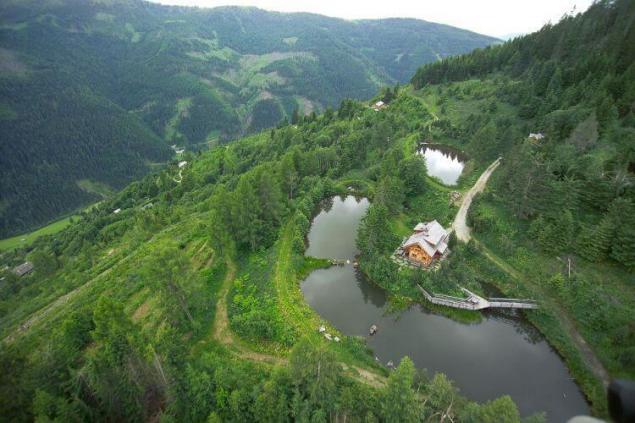
Three agrarian way
Sepp Holzer: "Permaculture can provide food at least three times more people than today lives on the globe. This is the nature you just need to negotiate. »
When in 1998 one of the Austrian students praised in his diploma thesis economic performance of the economy in Krameterhofe Sepp Holzer, the farm immediately visited the tax office. We conducted a full audit of the farm, basic revised performance indicators that are usually set once in 10-15 years. As a result, supervisory authorities have increased almost ten times the amount at which the previously calculate taxes, - from 24 thousand the then Austrian schillings per year to 200 thousand
.. When asked about why his farm was ten times more efficient than the average farm, Sepp Holzer said, it's all about permaculture.
Today, when we speak of agriculture, tend to have in mind the traditional industrial and his direction.
As is known, in industrial agriculture, synthetic fertilizers are used for the rapid growth of plants, pesticides, genetically modified organisms, as well as heavy farm equipment. This farmers get higher yields and profits, but the chemicals are harmful to the environment, and grown with their help fruits vegetables are often tasteless.
Traditional, or biological type of agriculture is characterized by the closeness to nature, a complete rejection of chemical means of protection and plant nutrition, the use of crop rotation. Its main advantage - getting healthy foods, lack of - low yields and high labor costs
. Permaculture offers a new type of conducting agricultural business, based on the relationships that exist in natural ecosystems. From traditional agriculture permaculture took the rejection of chemical fertilizers, and from industry -. Large farm machinery
Sepp Holzer calculates its costs, and, in his words, they are much more modest than in the industrial and traditional agriculture. "Firstly, I have less labor, which affects the pay - he explains. - Secondly, I do not spend time on the cultivation of plants - they help each other. Third, the quality of my products is higher, because I do not have to contend with weeds - all governed by nature, but I'm trying not to disturb her »
. The main difference between permaculture from industrial and traditional agriculture - respectful attitude towards all living beings. Trying to change the world, followers of permaculture always think about how their decisions will affect the other members of the ecosystem.
"Use your brain to move towards nature and not against it - teaches Holzer. - Do not attempt to fight the weeds, as this fight is extremely harmful to agriculture. We need to ponder: Can you take on the responsibility, if you change something? My secret: put yourself in the place of the pig, sunflower, earthworm, as well as the person who is in front of you. Well would you feel yourself at the same time? If yes, then you're doing it right. If not, then guess what is wrong. »
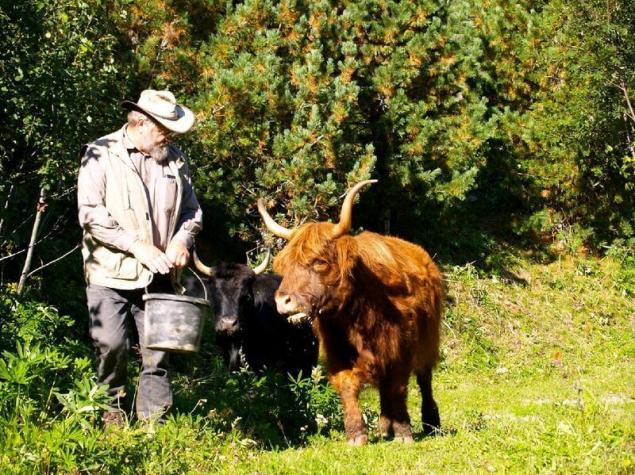
Sepp Holzer in Krameterhofe
The theory of mixed plantings
Sepp Holzer: "Become curious. Sow seeds a lot and watch what happens. What grows well - here to
place. " In modern agriculture made to grow on one type of crop fields. This monoculture of crops, according to Holzer brings only harm: the plants develop and bear fruit at the same time, require the same nutrients that makes them compete with each other
. Holzer goes the other way, promoting mixed planting. He is sure that when different species live side by side, there is a symbiosis between the two. Representatives of different species require different nutrients, moreover, they fed each other - fertilize the soil fallen leaves, dead roots of the
. Sepp Holzer talks about his estate in Austria. He, like his parents, growing cereals. But along with them at Holzer fruit trees, shrubs, vegetables, flowers. "Many believe that the cereal - monoculture, and it is not - he says. - On my site, they get along very well with other plants. When I remove the grain combine, then I leave 10 cm stems to prevent damage during harvesting other plants - radish, lettuce, carrots »
. Holzer is sure: specialization for entrepreneurs in agribusiness - are too risky, not only in biological, but also in economic terms. In his youth, he tried to find a specific niche, to deal only with it. One of his hobbies was breeding mushrooms - their Austrian produce, process, and even sold to other countries. But once the sale of mushrooms have fallen sharply, and he nearly went bankrupt. According to Holzer, versatility, on the other hand, creates confidence in the present and the future.
Changing landscape
Sepp Holzer: "Earth - the largest capital in the world. When used properly, the land will always bring wealth. »
Proper formation of the landscape can give higher yields of cultivated plants - is another tenet of the doctrine of permaculture
. Favorite elements of the landscape Holzer - land ridge (high hilly or flat) and crater gardens. Especially those, and others - in the form of: the different plants are planted one above the other stages, so not only increase the area under crops, but also to create different climate zones
. Land ridge runs in a mound height of about 1, 5 meters. It is ideal for wet areas, where much rain falls - the land dries out faster on it than on the plain. On the light-loving plants such as sunflower top floor grow well. There also planted fruit trees, but not the apple, whose roots creep along the ground, and with deep roots, like cherries, - these trees will be planted to protect the plants from below the wind. In the middle of the ridge planted any vegetables. And at its foot, where going to a lot of moisture, - cucumbers, squash, pumpkins, watermelons
. Crater garden is built on the same principle as the ridge of land, he only goes in depth. For a device of such a garden is chosen the lowest place on the site, where they can gather elevated and underground water.
Crater garden is very suitable for dry places, where additional moisture, it increases the area under cultivation, protects plants from wind, creates a heat trap and ideal for moisture-loving vegetables. In winter, the plants in a garden protected from wind and frost.
Instead, fertilizers and mechanization Holzer uses what is ready to share with us the nature on the site.
"Permaculture uses any land according to their suitability, - he says. - Imagine a country located on the slopes of the mountain. She should dress them, but they can not use the technique. »
Holzer regulates the condition of soil on his farm ... with the help of pigs. Where it is necessary to loosening, he scatters peas. Pigs are trying to find food and snouts loosen the soil. In addition pea pig found in the area and small insects. Eating them, they get valuable protein foods and Holzer eliminate the need for chemical anti-parasite remedies.
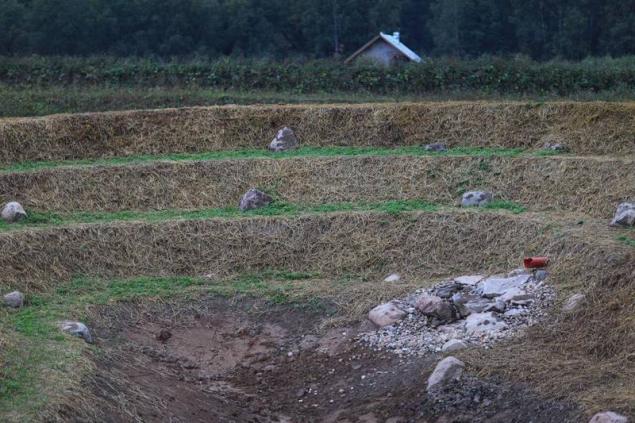
Crater Garden in Belarus was built by the method of Sepp Holzer
Lock for water
Sepp Holzer: "Water - the most important thing in the world. Without water there is no life. Everywhere in the world has enough water even in the wilderness. It is only necessary to learn how to find it and
proper use. " Restoration of water balance - a favorite theme of Sepp Holzer. Holzer against mechanized irrigation systems and explains that, although not always in sufficient quantities have springs and ground water, there are plenty of ways to bring water to his land.
The easiest - is to collect rainwater from the surface into the recesses for the accumulation of water, and then send it for watering plants
. Even better version - on their own to create a body of water, where such water will accumulate
. "In the Moscow region for the year on average 550-650 millimeters of rain falls, - says Holzer. - It is six thousand cubic meters. What happens with this water? It flows into the ravines, carrying the upper fertile layer of soil. It begins soil erosion, which increases due to the wind. Combine this with the bright sun. On the ground, there are cracks, the plants dry out, there is a risk of fires. Who is to blame - the nature or the owner of the site? Of course, people. Try to hold the water available on your site, and you'll save yourself a lot of trouble later. »
It is important to choose the location of the future reservoir. Every owner knows all the heights and valleys of your site, so can easily determine where in the end will drain water osadkovaya.
If the land is located in the plain, Holzer advised to watch the plants. For example, alder usually grows where there is underground water. So, next to her and other moisture-loving plants can safely hold the pond.
Austrian farmer provides to create reservoirs, eliminating the process of building a film, concrete and other materials that are commonly used for moisture retention. "I do not want to disturb the water cycle in nature, so I suggest filling a water tank in a natural way. In the future, this pond will not only contribute to the growth of plants - it will be possible to breed fish, crayfish, waterfowl, "- he explains
. In their ponds Holzer holds water only using natural materials. "Water always seeks to find a loophole to leak, so you need to find is a narrow neck and seal it. To begin with free space of the future pond on what passes water - sand, small stones. Then dig a trench depth of two to three meters and cover the bottom of a dense material, tamp it with an excavator. If you make a good lock, the water will not drain and
on the sides. "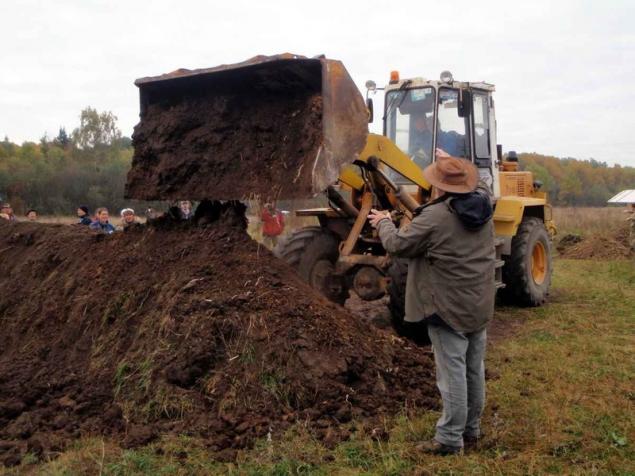
Sepp Holzer oversees the construction of a dam in one of the workshops on permaculture in the suburbs
Shaman trail
Sepp Holzer: "Russia has a huge territory and the best soil in the world, but you do not know how to use them correctly. Otherwise, you would have already overtaken the West. »
The interest in permaculture is large and is growing around the world - from the owners of large farms, small farmers working in the field of biological production of agricultural products, as well as on the part of those seeking to be closer to nature. Austrian farmer holds worldwide workshops, and they are successful.
Of course, for their seminars Holzer takes money, and earning some money. However, in Russia seminars are cheaper than in European countries.
The interest in our country from Holzer did not arise by chance. One day, ten years ago he was on the council of elders and shamans, chiefs of Indian tribes in North America. The meeting dealt with the changing world, about his fate. And the fact that there was discussed, quite influenced worldview Holzer. "I can not specifically tell you what they talked about shamans, as pledged to secrecy, but that's when I became interested in Russia. Unfortunately, I've heard about Russia many terrible things, which I did not want to believe, so I began to study your country ", - says the Austrian farmer
. Today Holzer more positive view: he believes that Russia can be not only a country of oil and gas, its future - for the agricultural sector. "The wealth of your country is not in minerals, and in large areas of high quality, fertile land, where it is possible to cultivate a wide variety of cultures, - he said. - Furthermore, relative terms in Russian better than elsewhere. For every person you have to on 8 hectares of land. No country in the world can offer to its citizens such.
But I was very surprised by the attitude of Russians to the earth, I often say, if farming unattractive. Such a statement is fundamentally wrong, and his example I want to prove
the opposite. " To prove the attractiveness of agriculture we do not need everything. In Russia there is a Center of permaculture Sepp Holzer, who popularized the idea of Sepp and helps him hold their workshops here.
The seminar participants can be divided into two conventional types. The first dream to move or have already moved with their families from the village. Their goal - to get close to nature, to establish a tribal settlement; or they simply love nature and want to live in harmony with it.
The second type - are entrepreneurs, and they are the majority
. Some also want to build a family estate, to grow up in it children and grandchildren.
But apart from the spiritual component of the people concerned and the material side of the issue, the practice of life. "It is very difficult to find organic products, the only guarantee of quality - products that raised itself", - says Anatoly from Samara, who studied in his time at the cosmonaut, but always worked in private business. Recently Anatoly accidentally discovered the idea of permaculture and realized - this is something that has long sought. Now, together with his family he chooses to land on which to grow vegetables. In the future, he plans to engage private consultancy. Stories of other participants are very different -., And similar at the same time
Musician Vladimir from Kaliningrad region wants to move the family to the ground, and then found a company that will help get to the village to everyone.
Renaldo of the Ulyanovsk region a year studying the principles of construction of settlements, and now in his plans - the creation of the brand, under which residents of ancestral homes will be able to realize a surplus of products grown
. Hleb from the Krasnodar Territory for ten years running the company in the field of tourism - it has akvaferma with trout and carp, he is now building a mini-hotel in the forest, there is going to apply their knowledge of permaculture
. Holzer says that he has a lot of successful projects in Russia - in the central part of the south and in Siberia. "Recently, I have started to cooperate with Tomsk Agricultural University: This large-scale project, but our experience can be useful to everyone - says Sepp. — Мы высадили лекарственные травы в ящик, который установили на дереве, получилось подобие гнезда. Растения начали карабкаться вверх по стволу дерева. Думаю, ландшафтные дизайнеры и те, кто занимается садом, могут воспользоваться нашей идеей.
Но самое главное, если обобщить, — аналогичный собственный огород, с помощью которого можно лечиться, под силу создать каждому городскому жителю. Для этого отлично подойдет балкон, а если его нет, то ящик с растениями можно закрепить на наружной стене или поступить, как сделали мы: установить зеленую аптеку на дерево».
Неудачных проектов у австрийского фермера мало. «Я бы не хотел их обсуждать, — говорит Хольцер, — потому что в первую очередь неуспех объясняю не своими ошибками, а тем, что проектам не уделялось достаточно внимания. Люди должны понимать, что невозможно сделать проект по пермакультуре один раз на пятерку и потом забыть о нем. Природа — это живой организм, который постоянно развивается и не дает нам отдыхать. Поэтому нужно много работать, анализировать свои ошибки и исправлять их».
Интуиция и самоорганизация
Сам Хольцер готов работать над ошибками постоянно: его основная цель — с помощью законов природы и принципов пермакультуры исправить ошибки прошлого, не допустить новых природных катастроф. Такая философия, безусловно, не может не находить отклика у неравнодушных людей, и, узнав о пермакультуре, многие из них начинают активно следовать учению.
Однако в большинстве своем люди скептически относятся к тому, что предлагает Хольцер. Опрошенные нами представители российского аграрного бизнеса говорят о том, что идеи Хольцера им импонируют. Но, отмечают они, практика пермакультуры подходит лишь для создания небольших нишевых проектов фермерских хозяйств или для садоводов-любителей.
Несмотря на заявленные масштабы, о которых мечтает Хольцер, применить его принципы в крупных хозяйствах сложно, а потому пермакультура не может стать основной для сельского хозяйства и составить конкуренцию индустриальному и традиционному земледелию. Причин тому несколько.
В основном сельхозпроизводителей беспокоит непредсказуемость хозяйствования «по Хольцеру». Аграрный бизнес вообще высокорисковый: просчитать ежегодный урожай очень сложно. Если же следовать принципам пермакультуры и во всем полагаться только на настроение природы, то прогнозировать экономические результаты будущей деятельности окажется еще сложнее. Реализация инновационных проектов по пермакультуре стоит немалых денег, поэтому при неудачном исходе (какой с природы спрос) хозяйства могут разориться.
Ряд наших респондентов смущает тот факт, что Зепп Хольцер — австрийский крестьянин, его опыт ограничен тем пространством, где он вырос. На ферме Хольцера в горах постоянно меняется температура, ярко светит солнце, летом может выпасть снег. И те знания, на которых основано земледелие у него на ферме, не являются универсальными и не могут распространяться на другие территории.
Многое зависит от человеческого фактора. Во главе крупного хозяйства, построенного по принципам пермакультуры, должен стоять такой же высококлассный специалист, тонко чувствующий природу и знающий ее законы, как Зепп Хольцер. К сожалению, подобных людей мало. Для того чтобы они появились, нужно пройти весь путь Хольцера с самого начала. Важно, чтобы у человека, помимо логики, хорошо работала интуиция.
Многим приемам нужно специально учиться, и не только у природы. Для этого требуется общение с единомышленниками. Кто возьмет на себя ответственность следовать принципам пермакультуры, быть учителем? Сейчас такой гуру есть — Зепп Хольцер. Но если его не станет, то рискует исчезнуть и сама пермакультура.
Другой вопрос: каким образом мотивировать наемный персонал, который будет трудиться на крупном сельхозпредприятии, чтобы и простые рабочие так же следовали природе, как руководители хозяйств?
Многих пермакультура привлекает своей простотой. Действительно, в природе само все растет, хорошо бы научиться этому не мешать. Но не всякому такое учение под силу — необходимы высокая самоорганизация, увлеченность, терпение. Это высшая ступень развития сельского хозяйства, к которой можно прийти лишь самостоятельно и осознанно.
Да и «интеллектуальное земледелие» Зеппа Хольцера, несмотря на всю популяризацию, по большому счету, остается штучным. Хотя и очень заманчивым.
Герои пермакультуры
Впервые о пермакультуре как об одном из способов спасения сельского хозяйства и природы в целом заговорили в начале ХХ века. Этот термин в своей работе использовал американец Джозеф Рассел Смит. В частности, он был против глубокой вспашки, считая, что таким образом лес сначала превращается в поле, а затем — в пустыню.
Тема истощения земель и водных биоресурсов волновала и других ученых, в частности Билла Молиссона. В 1970-е годы он более чем в 80 странах читал лекции по восстановлению агросистем и по природному дизайну. Молиссон понимал пермакультуру в узком смысле — например, использовал ее принципы в садоводстве. Затем его идея расширилась от земледелия до создания экопоселений.
Зепп Хольцер считает, что его замыслы отличаются от замыслов предшественников тем, что носят глобальный характер. Пермакультура Хольцера не ограничивается малым фермерством, а предполагает и освоение крупных проектов, получение от них экономической эффективности в промышленных масштабах.
В России идеи пермакультуры только начинают распространяться среди фермеров. В основном вести сельское хозяйство на принципах пермакультуры пытаются жители экопоселений.
. Austrian farmer confident that with the help of so-called permaculture can feed the entire planet. It is necessary for this quite a bit: do not interfere with nature
. For a long time, Sepp Holzer at home in Austria called rebellious farmer, but what he does - wild agriculture. For the rejection of the traditional norms of agriculture and experiments, he was forced to pay the fines; moreover, he faces a prison.

Now, know-how Holzer - the creation of land ridges crater gardens, ponds device - causing many experts and admiration of fans. The secret is simple Sepp Holzer. He oversees the nature and tries to live according to its laws.
Even as a boy on his father's farm, Sepp grew various plants. Then he convened in his garden all the friends and having fun with them, shared discoveries. Roughly the same thing happens today. Only now do not come to the Holzer guys from the school yard - go to it by professional farmers from around the world
. Holzer's farm is located in the mountains, at an altitude of 1300 meters above sea level. There's severe climatic conditions, for which he was placed in Krameterhofe called the Austrian Siberia. Even in July and August grounds Holzer can bring snow, but his mature plums, apricots, kiwi fruit and fine grapes.
"All come to me and look: what can grow on these steep slopes with bad weather and without fertilizers? - With a smile says Sepp Holzer. - And when they see the variety of exotic plants, then all are speechless
. Some of the Russian groups recently came to me and asked: "How is it that you are in bloom most beautiful rhododendrons, which can be naturally occurring, right up to the top of the Alps, but here in Moscow they do not grow?" < br>
Another asked: "Why do you have on the slopes so long Ponds - 80-100 meters, the water in these depressions may be delayed, and besides, still without a film? We can not save the water even on the plain ... "Then I start to explain to them that this is a normal natural process that nature itself will do everything, it is important to only stop to interfere with her.»

Three agrarian way
Sepp Holzer: "Permaculture can provide food at least three times more people than today lives on the globe. This is the nature you just need to negotiate. »
When in 1998 one of the Austrian students praised in his diploma thesis economic performance of the economy in Krameterhofe Sepp Holzer, the farm immediately visited the tax office. We conducted a full audit of the farm, basic revised performance indicators that are usually set once in 10-15 years. As a result, supervisory authorities have increased almost ten times the amount at which the previously calculate taxes, - from 24 thousand the then Austrian schillings per year to 200 thousand
.. When asked about why his farm was ten times more efficient than the average farm, Sepp Holzer said, it's all about permaculture.
Today, when we speak of agriculture, tend to have in mind the traditional industrial and his direction.
As is known, in industrial agriculture, synthetic fertilizers are used for the rapid growth of plants, pesticides, genetically modified organisms, as well as heavy farm equipment. This farmers get higher yields and profits, but the chemicals are harmful to the environment, and grown with their help fruits vegetables are often tasteless.
Traditional, or biological type of agriculture is characterized by the closeness to nature, a complete rejection of chemical means of protection and plant nutrition, the use of crop rotation. Its main advantage - getting healthy foods, lack of - low yields and high labor costs
. Permaculture offers a new type of conducting agricultural business, based on the relationships that exist in natural ecosystems. From traditional agriculture permaculture took the rejection of chemical fertilizers, and from industry -. Large farm machinery
Sepp Holzer calculates its costs, and, in his words, they are much more modest than in the industrial and traditional agriculture. "Firstly, I have less labor, which affects the pay - he explains. - Secondly, I do not spend time on the cultivation of plants - they help each other. Third, the quality of my products is higher, because I do not have to contend with weeds - all governed by nature, but I'm trying not to disturb her »
. The main difference between permaculture from industrial and traditional agriculture - respectful attitude towards all living beings. Trying to change the world, followers of permaculture always think about how their decisions will affect the other members of the ecosystem.
"Use your brain to move towards nature and not against it - teaches Holzer. - Do not attempt to fight the weeds, as this fight is extremely harmful to agriculture. We need to ponder: Can you take on the responsibility, if you change something? My secret: put yourself in the place of the pig, sunflower, earthworm, as well as the person who is in front of you. Well would you feel yourself at the same time? If yes, then you're doing it right. If not, then guess what is wrong. »

Sepp Holzer in Krameterhofe
The theory of mixed plantings
Sepp Holzer: "Become curious. Sow seeds a lot and watch what happens. What grows well - here to
place. " In modern agriculture made to grow on one type of crop fields. This monoculture of crops, according to Holzer brings only harm: the plants develop and bear fruit at the same time, require the same nutrients that makes them compete with each other
. Holzer goes the other way, promoting mixed planting. He is sure that when different species live side by side, there is a symbiosis between the two. Representatives of different species require different nutrients, moreover, they fed each other - fertilize the soil fallen leaves, dead roots of the
. Sepp Holzer talks about his estate in Austria. He, like his parents, growing cereals. But along with them at Holzer fruit trees, shrubs, vegetables, flowers. "Many believe that the cereal - monoculture, and it is not - he says. - On my site, they get along very well with other plants. When I remove the grain combine, then I leave 10 cm stems to prevent damage during harvesting other plants - radish, lettuce, carrots »
. Holzer is sure: specialization for entrepreneurs in agribusiness - are too risky, not only in biological, but also in economic terms. In his youth, he tried to find a specific niche, to deal only with it. One of his hobbies was breeding mushrooms - their Austrian produce, process, and even sold to other countries. But once the sale of mushrooms have fallen sharply, and he nearly went bankrupt. According to Holzer, versatility, on the other hand, creates confidence in the present and the future.
Changing landscape
Sepp Holzer: "Earth - the largest capital in the world. When used properly, the land will always bring wealth. »
Proper formation of the landscape can give higher yields of cultivated plants - is another tenet of the doctrine of permaculture
. Favorite elements of the landscape Holzer - land ridge (high hilly or flat) and crater gardens. Especially those, and others - in the form of: the different plants are planted one above the other stages, so not only increase the area under crops, but also to create different climate zones
. Land ridge runs in a mound height of about 1, 5 meters. It is ideal for wet areas, where much rain falls - the land dries out faster on it than on the plain. On the light-loving plants such as sunflower top floor grow well. There also planted fruit trees, but not the apple, whose roots creep along the ground, and with deep roots, like cherries, - these trees will be planted to protect the plants from below the wind. In the middle of the ridge planted any vegetables. And at its foot, where going to a lot of moisture, - cucumbers, squash, pumpkins, watermelons
. Crater garden is built on the same principle as the ridge of land, he only goes in depth. For a device of such a garden is chosen the lowest place on the site, where they can gather elevated and underground water.
Crater garden is very suitable for dry places, where additional moisture, it increases the area under cultivation, protects plants from wind, creates a heat trap and ideal for moisture-loving vegetables. In winter, the plants in a garden protected from wind and frost.
Instead, fertilizers and mechanization Holzer uses what is ready to share with us the nature on the site.
"Permaculture uses any land according to their suitability, - he says. - Imagine a country located on the slopes of the mountain. She should dress them, but they can not use the technique. »
Holzer regulates the condition of soil on his farm ... with the help of pigs. Where it is necessary to loosening, he scatters peas. Pigs are trying to find food and snouts loosen the soil. In addition pea pig found in the area and small insects. Eating them, they get valuable protein foods and Holzer eliminate the need for chemical anti-parasite remedies.

Crater Garden in Belarus was built by the method of Sepp Holzer
Lock for water
Sepp Holzer: "Water - the most important thing in the world. Without water there is no life. Everywhere in the world has enough water even in the wilderness. It is only necessary to learn how to find it and
proper use. " Restoration of water balance - a favorite theme of Sepp Holzer. Holzer against mechanized irrigation systems and explains that, although not always in sufficient quantities have springs and ground water, there are plenty of ways to bring water to his land.
The easiest - is to collect rainwater from the surface into the recesses for the accumulation of water, and then send it for watering plants
. Even better version - on their own to create a body of water, where such water will accumulate
. "In the Moscow region for the year on average 550-650 millimeters of rain falls, - says Holzer. - It is six thousand cubic meters. What happens with this water? It flows into the ravines, carrying the upper fertile layer of soil. It begins soil erosion, which increases due to the wind. Combine this with the bright sun. On the ground, there are cracks, the plants dry out, there is a risk of fires. Who is to blame - the nature or the owner of the site? Of course, people. Try to hold the water available on your site, and you'll save yourself a lot of trouble later. »
It is important to choose the location of the future reservoir. Every owner knows all the heights and valleys of your site, so can easily determine where in the end will drain water osadkovaya.
If the land is located in the plain, Holzer advised to watch the plants. For example, alder usually grows where there is underground water. So, next to her and other moisture-loving plants can safely hold the pond.
Austrian farmer provides to create reservoirs, eliminating the process of building a film, concrete and other materials that are commonly used for moisture retention. "I do not want to disturb the water cycle in nature, so I suggest filling a water tank in a natural way. In the future, this pond will not only contribute to the growth of plants - it will be possible to breed fish, crayfish, waterfowl, "- he explains
. In their ponds Holzer holds water only using natural materials. "Water always seeks to find a loophole to leak, so you need to find is a narrow neck and seal it. To begin with free space of the future pond on what passes water - sand, small stones. Then dig a trench depth of two to three meters and cover the bottom of a dense material, tamp it with an excavator. If you make a good lock, the water will not drain and
on the sides. "

Sepp Holzer oversees the construction of a dam in one of the workshops on permaculture in the suburbs
Shaman trail
Sepp Holzer: "Russia has a huge territory and the best soil in the world, but you do not know how to use them correctly. Otherwise, you would have already overtaken the West. »
The interest in permaculture is large and is growing around the world - from the owners of large farms, small farmers working in the field of biological production of agricultural products, as well as on the part of those seeking to be closer to nature. Austrian farmer holds worldwide workshops, and they are successful.
Of course, for their seminars Holzer takes money, and earning some money. However, in Russia seminars are cheaper than in European countries.
The interest in our country from Holzer did not arise by chance. One day, ten years ago he was on the council of elders and shamans, chiefs of Indian tribes in North America. The meeting dealt with the changing world, about his fate. And the fact that there was discussed, quite influenced worldview Holzer. "I can not specifically tell you what they talked about shamans, as pledged to secrecy, but that's when I became interested in Russia. Unfortunately, I've heard about Russia many terrible things, which I did not want to believe, so I began to study your country ", - says the Austrian farmer
. Today Holzer more positive view: he believes that Russia can be not only a country of oil and gas, its future - for the agricultural sector. "The wealth of your country is not in minerals, and in large areas of high quality, fertile land, where it is possible to cultivate a wide variety of cultures, - he said. - Furthermore, relative terms in Russian better than elsewhere. For every person you have to on 8 hectares of land. No country in the world can offer to its citizens such.
But I was very surprised by the attitude of Russians to the earth, I often say, if farming unattractive. Such a statement is fundamentally wrong, and his example I want to prove
the opposite. " To prove the attractiveness of agriculture we do not need everything. In Russia there is a Center of permaculture Sepp Holzer, who popularized the idea of Sepp and helps him hold their workshops here.
The seminar participants can be divided into two conventional types. The first dream to move or have already moved with their families from the village. Their goal - to get close to nature, to establish a tribal settlement; or they simply love nature and want to live in harmony with it.
The second type - are entrepreneurs, and they are the majority
. Some also want to build a family estate, to grow up in it children and grandchildren.
But apart from the spiritual component of the people concerned and the material side of the issue, the practice of life. "It is very difficult to find organic products, the only guarantee of quality - products that raised itself", - says Anatoly from Samara, who studied in his time at the cosmonaut, but always worked in private business. Recently Anatoly accidentally discovered the idea of permaculture and realized - this is something that has long sought. Now, together with his family he chooses to land on which to grow vegetables. In the future, he plans to engage private consultancy. Stories of other participants are very different -., And similar at the same time
Musician Vladimir from Kaliningrad region wants to move the family to the ground, and then found a company that will help get to the village to everyone.
Renaldo of the Ulyanovsk region a year studying the principles of construction of settlements, and now in his plans - the creation of the brand, under which residents of ancestral homes will be able to realize a surplus of products grown
. Hleb from the Krasnodar Territory for ten years running the company in the field of tourism - it has akvaferma with trout and carp, he is now building a mini-hotel in the forest, there is going to apply their knowledge of permaculture
. Holzer says that he has a lot of successful projects in Russia - in the central part of the south and in Siberia. "Recently, I have started to cooperate with Tomsk Agricultural University: This large-scale project, but our experience can be useful to everyone - says Sepp. — Мы высадили лекарственные травы в ящик, который установили на дереве, получилось подобие гнезда. Растения начали карабкаться вверх по стволу дерева. Думаю, ландшафтные дизайнеры и те, кто занимается садом, могут воспользоваться нашей идеей.
Но самое главное, если обобщить, — аналогичный собственный огород, с помощью которого можно лечиться, под силу создать каждому городскому жителю. Для этого отлично подойдет балкон, а если его нет, то ящик с растениями можно закрепить на наружной стене или поступить, как сделали мы: установить зеленую аптеку на дерево».
Неудачных проектов у австрийского фермера мало. «Я бы не хотел их обсуждать, — говорит Хольцер, — потому что в первую очередь неуспех объясняю не своими ошибками, а тем, что проектам не уделялось достаточно внимания. Люди должны понимать, что невозможно сделать проект по пермакультуре один раз на пятерку и потом забыть о нем. Природа — это живой организм, который постоянно развивается и не дает нам отдыхать. Поэтому нужно много работать, анализировать свои ошибки и исправлять их».
Интуиция и самоорганизация
Сам Хольцер готов работать над ошибками постоянно: его основная цель — с помощью законов природы и принципов пермакультуры исправить ошибки прошлого, не допустить новых природных катастроф. Такая философия, безусловно, не может не находить отклика у неравнодушных людей, и, узнав о пермакультуре, многие из них начинают активно следовать учению.
Однако в большинстве своем люди скептически относятся к тому, что предлагает Хольцер. Опрошенные нами представители российского аграрного бизнеса говорят о том, что идеи Хольцера им импонируют. Но, отмечают они, практика пермакультуры подходит лишь для создания небольших нишевых проектов фермерских хозяйств или для садоводов-любителей.
Несмотря на заявленные масштабы, о которых мечтает Хольцер, применить его принципы в крупных хозяйствах сложно, а потому пермакультура не может стать основной для сельского хозяйства и составить конкуренцию индустриальному и традиционному земледелию. Причин тому несколько.
В основном сельхозпроизводителей беспокоит непредсказуемость хозяйствования «по Хольцеру». Аграрный бизнес вообще высокорисковый: просчитать ежегодный урожай очень сложно. Если же следовать принципам пермакультуры и во всем полагаться только на настроение природы, то прогнозировать экономические результаты будущей деятельности окажется еще сложнее. Реализация инновационных проектов по пермакультуре стоит немалых денег, поэтому при неудачном исходе (какой с природы спрос) хозяйства могут разориться.
Ряд наших респондентов смущает тот факт, что Зепп Хольцер — австрийский крестьянин, его опыт ограничен тем пространством, где он вырос. На ферме Хольцера в горах постоянно меняется температура, ярко светит солнце, летом может выпасть снег. И те знания, на которых основано земледелие у него на ферме, не являются универсальными и не могут распространяться на другие территории.
Многое зависит от человеческого фактора. Во главе крупного хозяйства, построенного по принципам пермакультуры, должен стоять такой же высококлассный специалист, тонко чувствующий природу и знающий ее законы, как Зепп Хольцер. К сожалению, подобных людей мало. Для того чтобы они появились, нужно пройти весь путь Хольцера с самого начала. Важно, чтобы у человека, помимо логики, хорошо работала интуиция.
Многим приемам нужно специально учиться, и не только у природы. Для этого требуется общение с единомышленниками. Кто возьмет на себя ответственность следовать принципам пермакультуры, быть учителем? Сейчас такой гуру есть — Зепп Хольцер. Но если его не станет, то рискует исчезнуть и сама пермакультура.
Другой вопрос: каким образом мотивировать наемный персонал, который будет трудиться на крупном сельхозпредприятии, чтобы и простые рабочие так же следовали природе, как руководители хозяйств?
Многих пермакультура привлекает своей простотой. Действительно, в природе само все растет, хорошо бы научиться этому не мешать. Но не всякому такое учение под силу — необходимы высокая самоорганизация, увлеченность, терпение. Это высшая ступень развития сельского хозяйства, к которой можно прийти лишь самостоятельно и осознанно.
Да и «интеллектуальное земледелие» Зеппа Хольцера, несмотря на всю популяризацию, по большому счету, остается штучным. Хотя и очень заманчивым.
Герои пермакультуры
Впервые о пермакультуре как об одном из способов спасения сельского хозяйства и природы в целом заговорили в начале ХХ века. Этот термин в своей работе использовал американец Джозеф Рассел Смит. В частности, он был против глубокой вспашки, считая, что таким образом лес сначала превращается в поле, а затем — в пустыню.
Тема истощения земель и водных биоресурсов волновала и других ученых, в частности Билла Молиссона. В 1970-е годы он более чем в 80 странах читал лекции по восстановлению агросистем и по природному дизайну. Молиссон понимал пермакультуру в узком смысле — например, использовал ее принципы в садоводстве. Затем его идея расширилась от земледелия до создания экопоселений.
Зепп Хольцер считает, что его замыслы отличаются от замыслов предшественников тем, что носят глобальный характер. Пермакультура Хольцера не ограничивается малым фермерством, а предполагает и освоение крупных проектов, получение от них экономической эффективности в промышленных масштабах.
В России идеи пермакультуры только начинают распространяться среди фермеров. В основном вести сельское хозяйство на принципах пермакультуры пытаются жители экопоселений.


